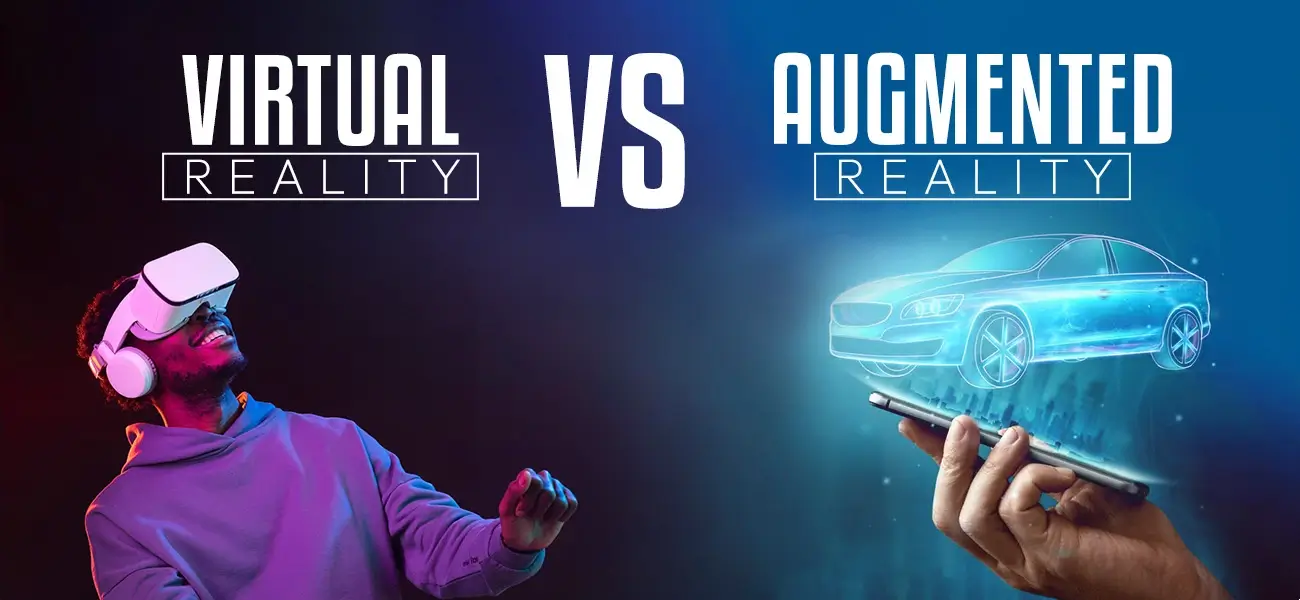Understanding the Differences Between Virtual Reality and Augmented Reality
Imagine slipping into a world that doesn’t exist—or enhancing the one you already live in with digital elements. As futuristic as it sounds, these experiences are becoming part of everyday life. But to truly grasp their potential, it’s important to understand the differences between Virtual Reality and Augmented Reality.

Though often mentioned together, they function in distinct ways, offering unique levels of immersion, interaction, and usability. Whether you’re exploring technology for entertainment, business, or education, knowing how these two differ will help you make better choices and unlock new possibilities in the digital space.
Differences Between Virtual Reality and Augmented Reality
-
Immersion: Real World vs. Digital World
VR
At its core, Virtual Reality (VR) offers a complete departure from the real world. By wearing a VR headset, users are immersed in a digitally created environment. Whether it's walking through an ancient city or flying through outer space, the experience is entirely synthetic, designed to trick your senses into believing you’re somewhere else. The real world is entirely shut out, providing users with a fully immersive digital experience.
-
AR
Augmented Reality (AR), on the other hand, enhances the real world rather than replacing it. Using devices like smartphones, tablets, or specialized glasses, AR overlays digital images, sounds, or text onto your actual surroundings. Imagine pointing your phone at a street sign and instantly getting historical information or language translation—that’s AR in action. The user stays rooted in the real world while interacting with digital enhancements.
-
Device and Hardware Requirements for VR and AR
VR
To experience VR, specialized hardware is essential. This typically includes a virtual reality headset, motion controllers, and sometimes sensors placed around the room to track movement. These VR devices are often tethered to high-performance computers or standalone units like the Oculus Quest. The hardware ensures smooth navigation and a seamless immersive environment.
-
AR
AR is much more accessible in terms of hardware. Most AR apps run directly on smartphones or tablets. Some advanced setups might use AR glasses like Microsoft HoloLens or Magic Leap, but for the average user, just a camera-enabled device is enough. The lower barrier to entry makes AR more readily available to the masses
-
Interaction with the Physical World in VR vs. AR
VR
In VR, the physical world is blocked out, and all interactions occur within the simulated environment. Users engage through hand controllers or motion tracking, making it ideal for gaming, virtual meetings, or architectural walkthroughs. This separation from reality enables rich, imaginative experiences but limits real-world awareness.
-
AR
AR thrives on the interaction between the digital and physical worlds. Users can touch, move around, and manipulate real-world objects enhanced by digital data. This makes AR perfect for tasks like interior design previews, technical support with overlay instructions, or even interactive learning environments.
-
Applications and Use Cases for VR and AR
VR
The application scope of virtual reality services is vast and expanding. In healthcare, VR is used for surgical training and therapy. In education, it enables students to explore historical events or conduct virtual science experiments. The gaming industry was one of the earliest adopters, offering deeply immersive game worlds that transform entertainment.
-
AR
Augmented reality services have revolutionized retail, marketing, healthcare and real-time information access. AR is used in apps like IKEA Place, where users can preview furniture in their space before buying. Museums use AR to enrich exhibits, and brands leverage it for interactive advertising. The real-time overlay of information onto the physical world makes AR a valuable tool in business and education.
-
Level of Complexity in VR vs. AR
VR
Building VR environments is a complex task requiring 3D modeling, motion tracking, and advanced physics simulations. Developers need to account for user interaction, spatial awareness, and sensory feedback. The immersive nature demands precision, making VR development resource-intensive and technically demanding.
-
AR
AR development is comparatively less complex but has its own challenges. Integrating digital content with real-world environments requires precise calibration and real-time responsiveness. Developers must ensure that AR objects respond naturally to light, angles, and user movement, but the reliance on existing environments reduces the design burden compared to VR
-
User Experience in VR vs. AR
VR
The user experience in VR is defined by total engagement. Users can look around, walk, and interact with the digital world as though it were real. This creates strong emotional and sensory reactions, which can be both thrilling and overwhelming. For some, prolonged use may lead to motion sickness or disorientation.
-
AR
AR offers a more intuitive and comfortable user experience. Users remain grounded in the physical world, making the transition between real and digital smoother. Since AR typically enhances existing tasks—like shopping or learning—it tends to have a lower learning curve and broader accessibility.
-
Social Interaction with VR and AR
VR
Social VR spaces, like VRChat or Meta Horizon Worlds, allow users to interact with others as avatars in virtual spaces. While this can foster deep engagement and collaborative workspaces, the physical isolation may limit real-world social cues and connections.
-
AR
AR supports social interaction in real-time, often improving communication rather than replacing it. Apps like Snapchat and Instagram filters are popular AR tools that encourage social sharing. AR’s integration with the real world keeps human connection intact while enhancing interaction with digital content.
Conclusion
As digital experiences continue to evolve, understanding the differences between Virtual Reality and Augmented Reality becomes more crucial. These technologies are not rivals but rather complements—each suited to specific goals and experiences. While Virtual Reality (VR) takes you to a completely new world, Augmented Reality (AR) brings the digital into your current world. Whether you are looking to engage with virtual reality services for training and gaming or explore augmented reality services to enhance retail and learning experiences, the future is full of possibilities.
From VR headsets delivering fully immersive digital experiences to AR apps enriching our daily lives, both Virtual Reality technology and Augmented Reality technology have transformed how we interact with the world. And with increasing accessibility through VR devices and augmented reality mobile apps, these experiences are now within reach for businesses and individuals alike. Ready or not, the next digital revolution is here—and it’s augmented, virtual, and vividly real.
Frequently Asked Questions
Yes, augmented reality (AR) can change our reality by blending digital elements with the physical world. It enhances how we perceive, interact, and experience real-life environments. From education and healthcare to retail and gaming, AR revolutionizes daily experiences, offering more immersive, engaging, and context-rich interactions that go beyond traditional media or tools.
Augmented reality (AR) overlays digital content—like images, sounds, or 3D models—onto the real world using devices such as smartphones or AR glasses. It works through sensors, cameras, and processors that recognize the environment and display relevant data in real-time, allowing users to interact with virtual elements in a real-world context.
Augmented reality offers numerous advantages: it enhances learning through interactive visuals, improves customer experiences in retail, aids professionals in training and simulations, and boosts engagement in marketing. AR bridges the gap between digital and physical worlds, offering real-time information, reducing errors, and creating memorable, personalized user experiences across multiple industries.
Virtual reality (VR) immerses users in a completely digital environment, replacing the real world, while real life involves genuine physical surroundings and interactions. VR is simulated and controlled by technology, whereas real life is spontaneous and sensory-rich. Essentially, VR is artificial immersion; real life is the authentic, natural experience.



